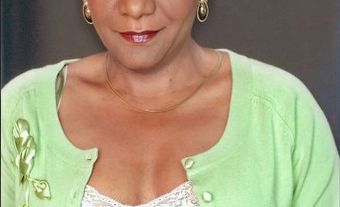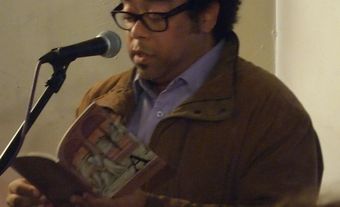
Djanet Sears, née Janet, playwright, director, producer, actor, teacher (b at London, Eng 1959). Djanet Sears immigrated with her family to Saskatoon, Sask, in 1974 and relocated to Oakville, Ont, the following year. She acquired a BFA honours degree in theatre from York University in 1999 and studied at the Canadian Film Centre and NYU in New York. In the 1980s, questioning her place in Canada as a member of a visible minority and in search of her ancestral roots, she made a journey to Africa. It was a cathartic experience and upon returning to Canada, she constructed the play Afrika Solo. It brought her national recognition, and she became a lightning rod and galvanizing force for the African-Canadian theatre movement.
Influenced by West-African forms of epic storytelling, Sears developed a signature dramaturgy and performance style that supported and developed its narrative material through choral technique, rhythms, singing and movement. Afrika Solo was premiered in 1987. Recorded by the CBC in 1990, the play won the silver prize at the 1991 International Radio Festival of New York as well as a Major Armstrong Award for outstanding radio drama. Its publication in 1990 made it the first published play by a Canadian woman of African descent.
Djanet Sears wrote the plays Double Trouble (1988) and Who Killed Katie Smith? (published in 1994) before completing what was to be her most critically acclaimed work, Harlem Duet (1995). Conceived as a prequel to Shakespeare's Othello and told from the perspective of Othello's first wife, the Afro-American Billie, it was directed by Sears, produced by the feminist Nightwood Theatre, and prèmiered at Toronto's Tarragon Theatre in 1997. It was remounted the following season at the Canadian Stage, marking that company's first production of an African-Canadian play. Harlem Duet won the Governor General's Literary Award (1998), four Dora Mavor Moore Awards and the Floyd S. Chalmers Award (1998) for outstanding new play. Sears's next play, The Adventures of a Black Girl in Search of God (2002), a re-visioning of a George Bernard Shaw short story, was shortlisted for a 2004 Trillium Book Award.
In 1997, Sears was instrumental in generating the first AfriCanadian Playwrights Festival, honouring and celebrating the work of black theatre artists. In 1999, she was a founding member of the Toronto-based Obsidian Theatre, which is dedicated to increasing the Canadian awareness of the Afro-Canadian experience. Sears has also edited two Afro-Canadian theatre anthologies - Tellin' It like It Is: a Compendium of African Canadian Monologues for Actors (2000) and the two-volume Testifyin': Contemporary African Canadian Drama (2000 & 2003).
In 2000, Djanet Sears became an adjunct professor of drama at the University of Toronto, teaching playwriting. She was the 2004 writer-in-residence at the University of Guelph. In recognition of her contribution to the establishment of the Black arts movement in Canada, she received the Martin Luther King Jr Achievement Award in 2003. Other awards include the 1998 Harry Jerome Award for Excellence in the Cultural Industries and the Stratford Festival's Timothy Findley Award in 2004.
In the summer of 2006, Sears directed a production of her play Harlem Duet for the Stratford Festival. It was another historical watermark as the first play written and directed by a black woman with an all-black cast to be presented at the festival.

 Share on Facebook
Share on Facebook Share on X
Share on X Share by Email
Share by Email Share on Google Classroom
Share on Google Classroom

